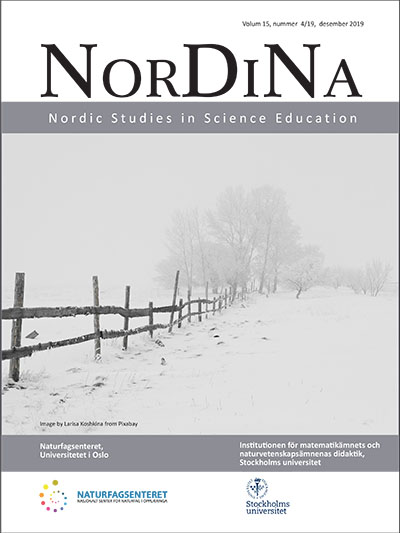New Obligations and Shared Vulnerabilities: Reimagining Sustainability for Live-Able Worlds
DOI:
https://doi.org/10.5617/nordina.6407Abstract
STEM and sustainability education have become established concepts in what are understood to be progressive Canadian early childhood (EC) programs, often framed as a conduit for building more sustainable futures. But, how young children learn about ecological systems creates material consequences in the world. In an action research, inquiry-based study on the West Coast of Canada, we use arts-based collaborative methods and a feminist environmental framework to unsettle the foundational logics continuing to uphold the untenable patterns of living that children are learning to contend with. Recognizing the importance of promoting livable futures as a central concern to educators, practitioners and researchers in the field, this article invites reflection of the field’s dual obsession with enhancing children’s cognitive development and perpetuating notions of a pure and separate sphere within which childhood is imagined to exist. It explores the potential of looking within our pedagogies and practices for potential complicities in promoting the very conditions we seek to change. This research proposes a common worlding approach in early childhood education as a method for shifting anthropocentric understandings about the so-called ‘natural world’ and our place in it. In particular, it raises concerns with capitalist and colonial values that continue to permeate popularized STEM and sustainability frameworks in North America.
Downloads
Published
Issue
Section
License
Authors who publish with this journal agree to the following terms:- Authors retain copyright and grant the journal right of first publication with the work simultaneously licensed under a Creative Commons Attribution License that allows others to share the work with an acknowledgement of the work's authorship and initial publication in this journal.
- Authors are able to enter into separate, additional contractual arrangements for the non-exclusive distribution of the journal's published version of the work (e.g., post it to an institutional repository or publish it in a book), with an acknowledgement of its initial publication in this journal.
- Authors are permitted and encouraged to post their work online (e.g., in institutional repositories or on their website) prior to and during the submission process, as it can lead to productive exchanges, as well as earlier and greater citation of published work (See The Effect of Open Access).


